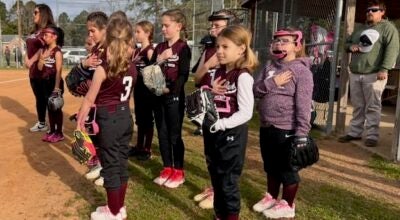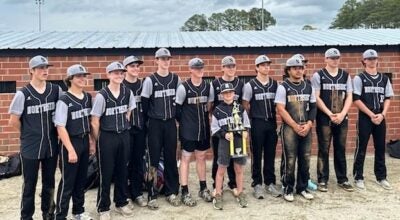Lifetime hunting and fishing licenses, a good investment
Published 12:40 pm Tuesday, June 16, 2015

FRED BONNER | CONTRIBUTED
This young dove hunter was given a North Carolina Lifetime Hunting and Fishing License when he was one year of age. It guarantees that the individual who owns such a license can hunt (big game, small game, state waterfowl stamp and bear E-stamp), fish (both fresh and salt water) and trap — covers his outdoor license requirements in North Carolina no matter where the license holder resides for the rest of his life. This license was a good investment.
It must have been in the late 1970s when a well-known North Carolina Wildlife Resources Commissioner approached me and talked me into purchasing a relatively new kind of hunting and fishing license. It wasn’t cheap, but after he explained to me that by buying this license I was buying the privilege to hunt and fish in North Carolina for the rest of my life. Even if I bought the license as a resident and later moved out of North Carolina, I was covered under the new North Carolina Lifetime Sportsman’s License.
I was aware that for years the U.S. Department of the Interior (U.S. Fish & Wildlife Service, USFWS) was pushing for every coastal state to have legislation passed that would require all saltwater fishermen to have a license and try to have the individual state’s saltwater fishing license operational and in place. If the states did not have a saltwater license in the next few years, the feds were going to try to have a national saltwater fishing license for anglers to fish in all tidal waters.
When I asked the NCWRC Commissioner if this new license would cover saltwater fishing as well as the standard freshwater fishing license, he assured me that this new license would cover “all the waters of North Carolina including the salt waters of our state as well.”
Those words later came back to haunt the N.C. Wildlife Resources Commission after the N.C. Division of Marine Fisheries and the relatively new North Carolina Coastal Conservation Association (NCCCA) began to push for a separate saltwater fishing license.
To soften the blow to fishermen who might oppose a new N.C. saltwater fishing license, the proposed new license (tax) was to be called a Coastal Recreational Fishing License, or CRFL.
There was also a new license that came into being around this time called a Unified Sportsman/Coastal Recreational Fishing License. This new license does give lifetime hunting and fishing privileges in the entire state to all sportsmen for their lifetime. Call it whatever you want, but this license is one of the very best things that’s ever happened to North Carolina’s hunters and fishermen.
Most of North Carolina’s fishermen were in favor of the new proposed CRFL because they saw a real need for funding a host of saltwater fishing programs, such as building a lot of new and improved boating access ramps and vastly improving fishery management rules and regulations. The new CRFL also headed off the proposed federal saltwater fishing license (for now anyway).
When outdoorsmen who had already purchased the N.C. Lifetime Sportsman’s Hunting and Fishing License became irate and demanded that the NCWRC back up their promise that the license they’d bought in good faith covers all saltwater and freshwater fishing. The NCWRC was forced by the N.C. Division of Marine Fisheries and the assorted saltwater angler’s groups to pay several millions of dollars to the DMF to have Lifetime Sportsman’s Hunting and Fishing Licenses that were bought before a given date in 1981 grandfathered in under the new Coastal Recreational Fishing License. It cost the NCWRC a bunch of dollars, but the Wildlife Commission stuck to their promise to our fishermen that their old license would cover all angling in North Carolina, be it salt or fresh water.
If an outdoor sportsman had purchased a Lifetime Sportsman’s Hunting and Fishing License prior to January 1, 2006, then they were grandfathered in for the new Unified Sportsman/Coastal Recreational Fishing License. They are also grandfathered in on the new N.C. bear hunters E-stamp.
Probably one of the nicest gifts a grandparent or friend could ever give to a new baby (one year of age or less) is to purchase the infant’s license of the UCRFLs. This child could be either a North Carolina resident or a non-resident. The cost of this “Infant’s UCRFL” is $275 and it guarantees that this person will be able to hunt and fish in North Carolina for their entire lifetime.
What’s really nice about all of the lifetime licenses is that the original price of the license goes into the Conservation Endowment Fund where it will remain, untouched and drawing interest forever. The interest from this Endowment Fund is used for fish and wildlife conservation. The principal just sits there drawing interest.
If the interest money used by the Wildlife Commission for fish and wildlife conservation should be our part of the state’s 25 percent state matching money and then matched by the 75 percent federal matching money (gained from the excise taxes paid by sportsmen on their gear and equipment), you can imagine how much money the NCWRC has available to be used every year. This money clearly shows how the hunters and fishermen pay the lion’s share of the money used for fish and wildlife conservation in our state.
Currently the Endowment Fund is valued at $111,655.000.00. There are currently 722,000 Lifetime Sportsman Licenses (old and new) owned by resident and non-resident sportsmen.





